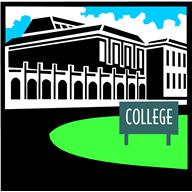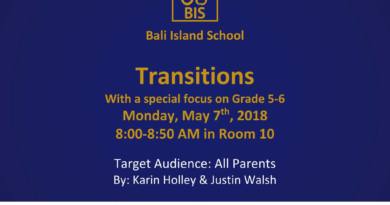Primary eNews – November 20, 2020
Please check out upcoming events & see the Cohort Gold & Blue at the BIS Events Calendar
Service as Action is in full swing at BIS!
Sienna Sutherland from Grade 6 and Mrs. Erickson have been working hard together on organizing an exciting virtual fundraiser to benefit a few of the villages at the base of Mt. Agung. Virtual “races” are all the rage now where you register for an activity and do it wherever you like during the allotted event days. What a great way to build community online and help people in need at the same time! Please check out the information in the poster below and register by December 2nd for this fun event.
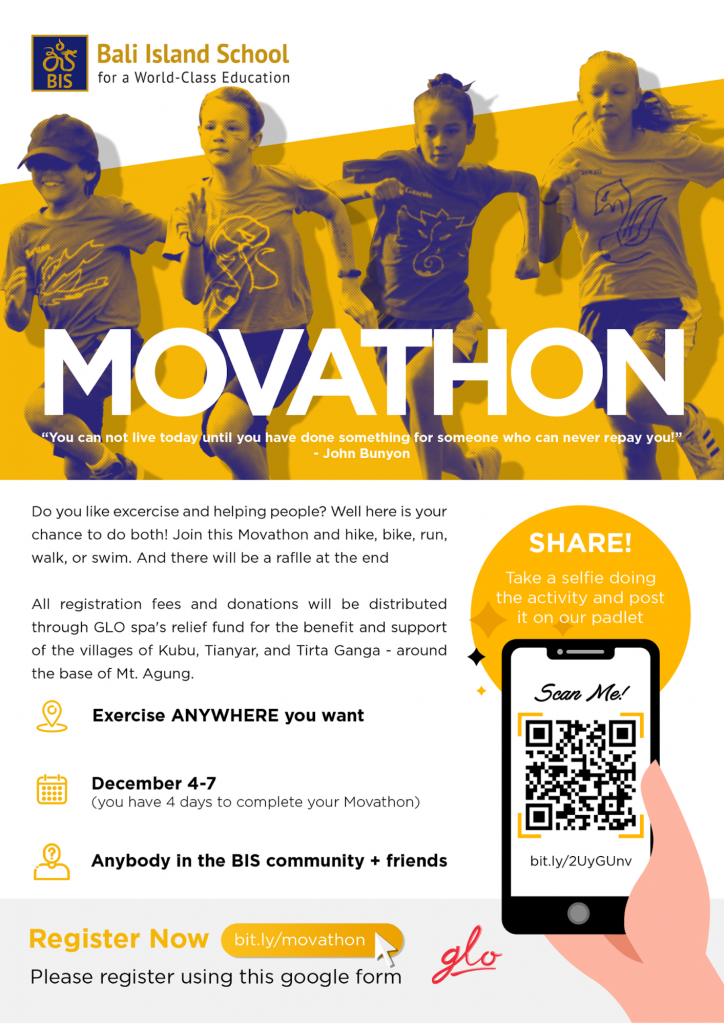
Grade 4: Tuning in to Where We Are in Place and Time
Grade 4 has started their third unit of inquiry: historical figures, civilizations and their technologies continue to impact modern day society, with a pre-assessment task to establish what we already know and highlight any misconceptions we may have as a group.
So what do we know?
We thought about what are some inventions and discoveries of the past and know:
- There were pharaohs (kings) in old Egypt and the doctors could make them into mummies
- The wheel makes moving easier
- Makeup has changed from using hands to using paintbrushes
- The windmill made crushing grain easier
- The automobile made traveling faster
- Sundial clock so we could measure time
- Phone so you can message people
- Egypt is history and ALL history matters
- Many discoveries come from Egypt I think
- The Wright brothers invented the first plane
- America was discovered
- Fire and tools because now we use them a lot
- The pencil and eraser because it meant you could write smudges and delete it. WOW!
- Clothes to protect us and keep us warm
- The pyramids because it taught us how to bury the dead
Some curiosities we want to find out about:
- Who started to discover tools?
- Who are some inventors from our home and host countries? What did they invent?
- Are mummies real?
- How has the wakeboard changed? Where did it come from?
- Is the civilization “Atlantis” real?
- What were phones and ipads like “back then”?
- Is Egypt modern now? What are the pyramids made from?
- Everything about Ancient Egypt
- Why is history so important?
- How did people get shelter?
- Languages, numerals and American history.
With our CURIOSITY “sparked”, we started FINDING out all about SIMPLE MACHINES.
We watched a video and independently researched a little more into the six (6) different simple machines: pulley, lever, wedge, inclined plane, wheel and axle, and screw, before searching our immediate environment for examples of these.


We made our own “spring scales” (Newton-meters) to find out if an inclined plane would make lifting a heavy object easier or not and played with levers, screws, and pulleys.


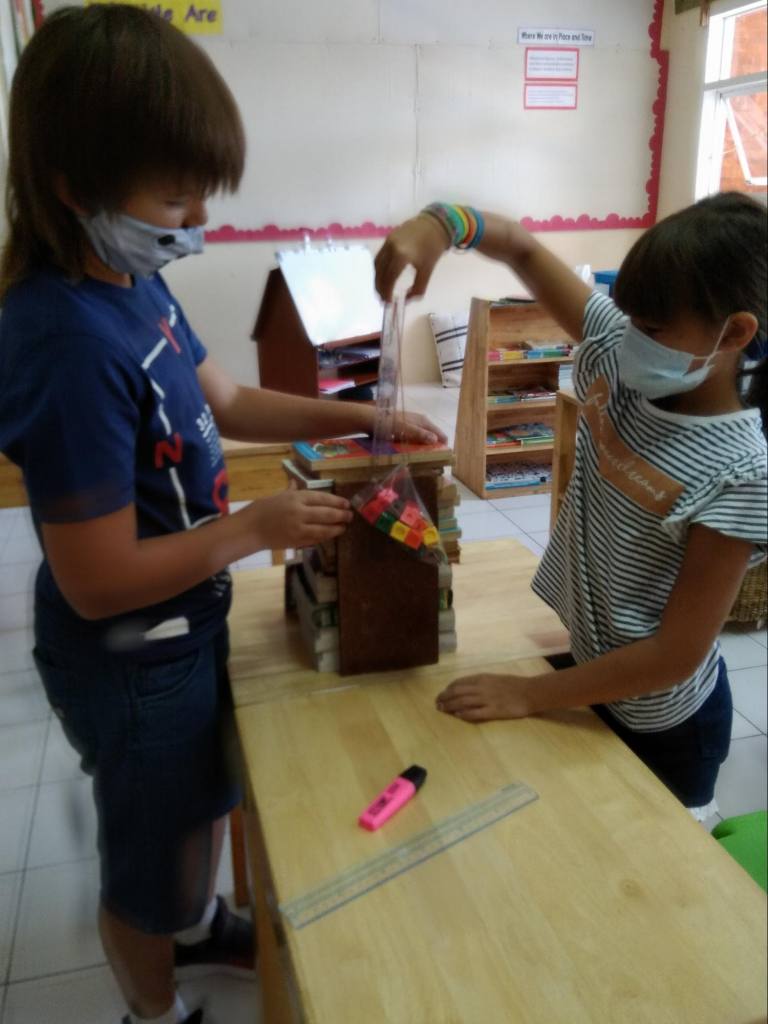
Finding out is FUN!
How We Organize Ourselves: Grade 2 Community Inquiry
Our Unit of Inquiry, How We Organize Ourselves led the Grade 2 class to investigate the interconnectedness of human-made systems and communities and how those meet people’s needs. The class explored services in our community, why we need them and how do they work together to be successful. The summative assessment for this unit was building and creating a class community, as well as answering: “What would happen if what you made for our project did not exist in our community?”
The “Class Community Project” was a multi-faceted step-by-step activity. After a careful inquiry into the workings of our community and its structures, students were given a choice to explore an area of a community:

The next step of our project was planning. Mr. Marshall, our wonderful school librarian supported us and joined our class on Zoom to help plan and investigate on how and what the students could construct. We used the following plans to get our thinking soaring:

Of course, the step of the project with the biggest popularity was building the structures. Children gathered materials, set up their workspaces, and build amazing community places. Our remote-learning situation didn’t stop our class from excelling at their crafts. Everyone brought in their structures to school at the end of the week and Ibu Made, our amazing Indonesian teaching partner, set up “Our Class Community”:

Our inquiry ended with a very important question “What would happen if your structure did not exist in our community?” Students were asked to give 3-4 sentences to answer this question. Here is the superb thinking of our future Engineers/Urban Planners:
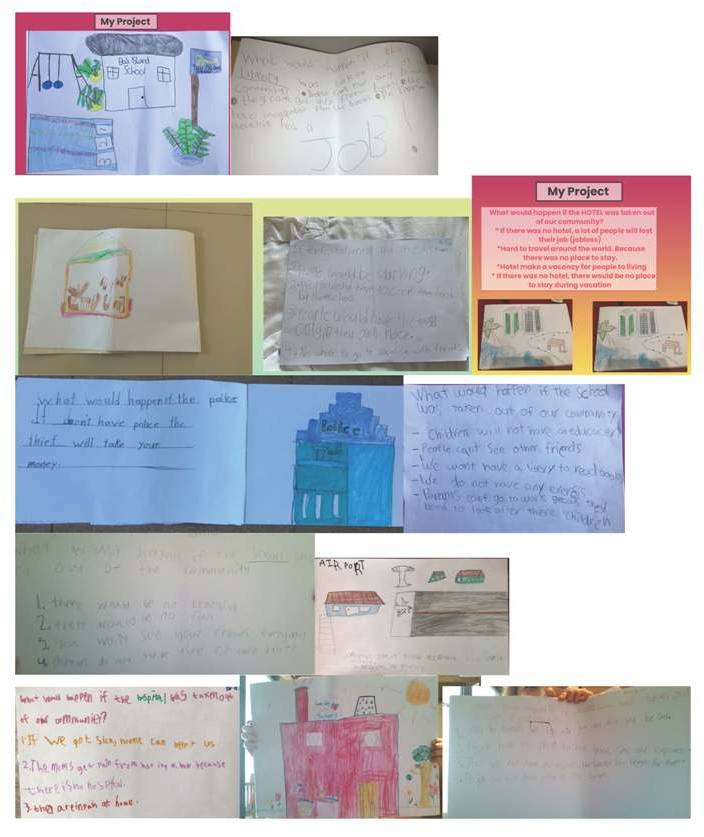
Primary StuCo

Dear parents, teachers, and primary students,
We would like to inform you about the Junior Student Council (Junior StuCo). Junior StuCo is an opportunity for students to have a voice in making our school a better place through positive change.
Students from grades 3-5 can join. Only 2 people will be elected from each grade except for grade 5 (there will be 3-4 students so that they could help the younger ones.) We would also like to have them handed in by Wednesday 2nd December.
This is how it will work. The students will write a simple speech of a few sentences or a paragraph on how they could help improve the school. These speeches will happen in classrooms next week. Then the class votes for the top two students that they would like to represent their grade (decide with your teachers a fair way to do this.) Please don’t just vote for your friend, vote for the best voice for your class! There will be a meeting every week at lunchtime on Wednesday (either face to face or over zoom).
Warm regards,
Grade 5
Counseling
Primary students will be returning to campus next week. Pre-K to 1 started this past week. Be prepared that your child might have mixed emotions about returning. They might be nervous about seeing friends and teachers or feeling like they forget some of their academic skills. They might be worried about their cohort or their safety. Understand also that your child might feel tired when they get home more than you expect. For some time, they have not been sitting and engaging their core muscles in the way they do at school. The adjustment will take time.
How can you help with this adjustment?
- Prioritize well-being and adjustment to their return over learning outcomes.
- Provide art supplies for releasing emotions.
- Listen to and acknowledge their concerns.
- Speak kindly.
- Reassure by explaining all that your family and the school is doing to keep them safe.
- Check how they feel about wearing the mask and washing hands throughout the day.
- Normalize their feelings, including those of anxiety or stress.
- Ask how they are enjoying their cohort.
- Check your feelings because they pick up on how you are coping.
- Make sure you are focusing on being balanced as a family.
- Seek support if you are struggling. I am here for parents and students.
- Provide time in the evening before bed (at least two hours before bedtime) where screen usage stops. A family agreement of no device usage after dinner keeps it simple.
- Be patient with them and yourself.
- Get out in nature.
- Laugh and have fun together.
- Remember that you are your child’s safe space. Sometimes this means they displace their feelings on you. Think connection before correction.
BIS is proud to be an Inclusive School
BIS is an inclusive school. This means we welcome students with various learning differences and challenges. Some students in our community have physical, cognitive, language or emotional challenges that preclude them from learning successfully at home or online. In order to support these students, we have accommodations in place so that they are able to access learning in ways other children are able to do independently. Inclusion may sometimes feel unfair, but I can assure you that environmental and instructional strategies and supports in fact level the playing field so that learning can occur for each individual student equitably. For example, we would not ask students who need eyeglasses to leave them at home because it gives them an unfair advantage of seeing more clearly over those who don’t wear them.
Why is BIS an inclusive school? When children attend classes in a school that reflects the diversity in real-world populations, they learn to understand and appreciate these similarities and differences. Thanks to our inclusion practices at BIS, ALL of our students learn the valuable character traits of empathy and respect, caring, and open-mindedness. It is a real strength of our school and an aspect I hope you are all equally proud of the BIS inclusion program.
Of note, over the past 15-20 years, there has been an increasing number of international schools that offer inclusion programs. Prior to this important development, expat families who had children with learning challenges would often make the decision to stay in their home country. BIS was an early adopter, providing greater access and differentiated learning and support for families considering Bali, Indonesia.
We have invited students whose identified learning differences put them at greater risk for failing to learn during this Distance Learning period, onto campus for support. They follow the school’s stringent safety procedures while learning on campus.
Thank you for celebrating differences with us and for your understanding of the supports we have in place for some members of our BIS family.

